|
Keeping
ones principles up and trying to be a good man is a
difficult task at times.
Hansgeorg Lopatta was born April 18, 1910, in Ober-Radoschau
part of Rybnik County in Germany and
was about to face this problem.
His
parents lived in this area their entire lifetime and
went through some severe changes in lifestyle,
politics and ethnicity. With its substantial coal mining
activities, it certainly could be compared to the Ruhr area
on the opposite, the west site, of Germany. The city of Rybnik
and its county was a very German country under Prussian
territory and therefore influenced by its customs and
traditions from 1740 to 1922. Germany had lost the 1st
World War and due to its Polish influence after an
unruly time - Silesian Revolts - it was subject to an election
that changed the course of its dependency for the next 17
years.
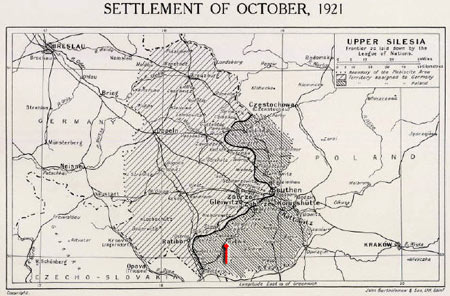
published
on http://www.davidrumsey.com/
|
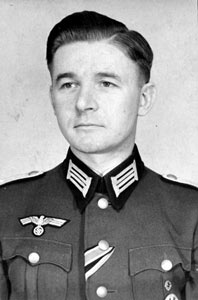
Grandfather as 1st
lieutenant wearing his silver NSDSt honor badge
with the rest of his decorations |
Not just the very
different language spoken on the German and Polish
site but also the cultural differences of this
overlapping area made a living across borders
rather difficult. One can imagine that it may not
have been a choice of life either with the customs
one was used to growing up with, or to adapt to the new
regime with its laws and ways. One would think
that it must have been easy to cross back to the
old mother land and fully integrate despite having
just a few years back acquired a passport. Imagine
one had to live life through the exact same process
again just a
few years later with the outbreak of WWII and then
one more time with the loss of the same war. This
second time, after the eviction by the latest victors - the
Russians made life harder. It did
happen indeed and Hansgeorg Lopatta had to face
again the judgment of its earlier adaptation.
The denazification
process.
At
that point we find clear evidence in form of his
hand written notes to prepare his appeal to the
denazification court in West-Germany.
Freshly sentenced he was classified in category
4 in the laws opinion; meaning he
was a supporter of the Nazi movement. How did it
come to this? |
All
grown up he started to study structural engineering 3rd
quarter of 1931, but had a tough time taking courses in
Germany since he grew up in the polish part of
Oberschlesien (Upper Silesia). He joined the NSDAP
during those politically changing times in 1933 in order
to adapt, to blend in with his fellow German students.
Keep in mind that his parents still lived in Poland and
had the polish citizenship.

Furthermore,
being a member not being good enough for this Pole he
was also pushed into joining the SS in November of 1933.

Grandpa
must have also been a member of the NSD-Studentenbundes
(NS German Student Society) before January 30, 1933,
since he visibly wears the special silver honor badge on
his uniform. Certainly joining these two organizations
was another very important step to completely adapting
to and out maneuver un-pleasantries of
his peers because of his parents' Polish citizenship. He
also joined the Army reserve engineer corps in March
1935 to add to his studies and more importantly to show
his support for his country - Germany.
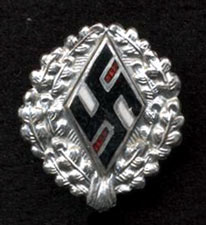
Silver
Honor Pin of the NSD-Student Society
With
promotion to Feldwebel d.Res
(reservist Sergeant) during the Summer of
1938 he was finally promoted to Unterscharführer
der Allgemeinen SS (equivalent rank to the Army
junior NCO).
The
reason his promotion came so slowly, he stated, was his repeated refusal to drop
his polish last name - Lopatta.

He
further writes in his appeal the following:
”November 9,
1938, at 9:00 pm in the evening a SS commando arrived
from Gross-Strehlitz O/S to Bischofstal (my residence
town) and demanded from me to burn down the synagogue. I
refused and ordered the commando to return to its
origin. (Witness is available to testify not only for
this but that I did not take part in the Crystalnight riots)"

He
ended his SS Membership October 08, 1939, to be able to
marry his wife Charlotte in a church wedding and to
properly baptize his daughter Barbara. The SS prohibited
any involvement of this kind with the Catholic Church.

The
last two notes are certainly very untypical for someone
during that time. Non-conformance at a point even that
earlier during the III. Reich did certainly not help
one's chances to shine. Hansgeorg was clearly conflicted
as the Germans went to war against Poland - his
country?!
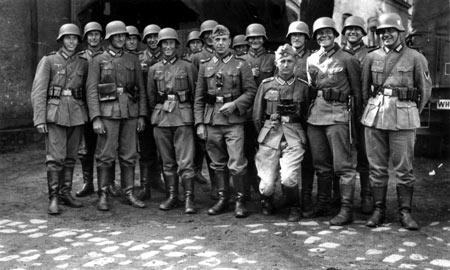
Grandpa
as Sergeant with his squad
He
finally came back home February 23, 1944, with a severe
lung injury and was kept in Branitz O/S, close to
Ratibor ((Branice) Leobschütz County).
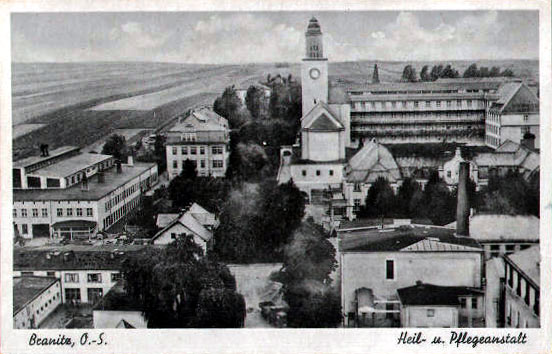
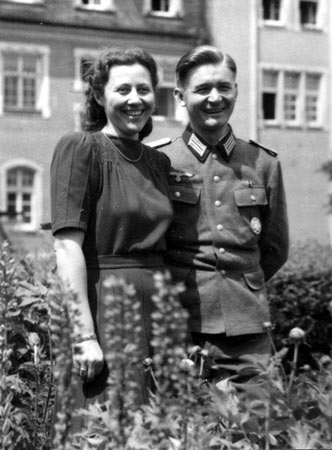
Grandfather
and Grandmother in 1944 at the Branitz Military Hospital
The
war not being over the following letter testifies for
yet another story:
|
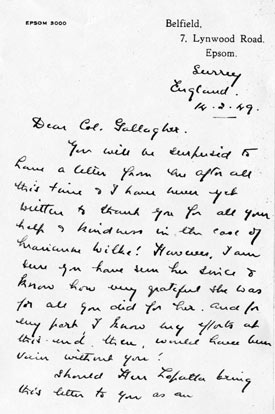
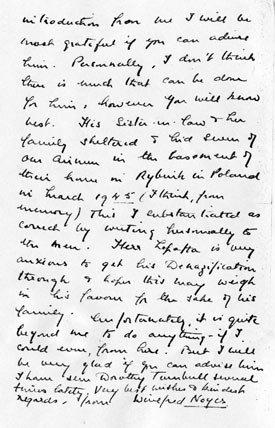
|
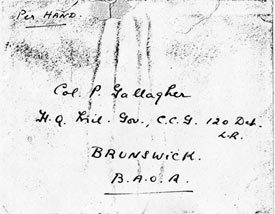
EPSOM
3000
Belfied,
7, Lynwood Road
Epsom.
Surrey
England.
14.2.49
Dear
Col. Gallagher,
You will be surprised to have a letter from me after all
this time & I have never yet written to thank you
for all your help & kindness in the case of Marianne
Wilke! However, I am sure you have seen her since &
know how very grateful she was for all you did for her
and for my part I know my efforts at this and then,
would have been vain without you!
Should
Herr Lopatta bring this letter to you as an
introduction from me I will be most grateful if
you can advise him. Personally, I don't think
there is much that can be done for him, however
you will know best. His sister in law & her
family sheltered & hid seven of our airmen in
the basement of their home in Rybnik in
Poland in March 1945
(I think from memory) this I substantiated as
correct by writing personally to the men. Herr
Lopatta is very anxious to get his Denazification
through & hopes this may weigh in his favor
for the sake of his family. Unfortunately it is
quite beyond me to do anything - if I could
even, from here. But I will be very glad if you
can advise him. I have seen Dorothy Turnbull
several times lately. Very best wishes &
kindest regards, from Winefred Noyes
|
The
mention of those British airmen may be another story,
but is certainly linked to the family. Grandpa's nephew
was watching convoy's of Russian, British and US POWs
during the fall of the Reich marching by their family
estate. He remembers four British soldiers in their back
yard that were hidden in their basement thanks to the
mercy of his mother .
Another
day one German soldier guarding three British soldiers
stopped at their house. He recalls the German soldier
leaving the three POWs behind since one of them had a
fresh surgery wound and was dying. Luckily Grandfather
Hansgeorg's sister in
law, a medical student, was able to help the injured
British POW. They all survived.
All
seven were kept in hiding until March of 1945.
Their
names based on Grandpa's diaries are as follows:
One
of the British soldiers left his cap badge behind as a token of
appreciation:
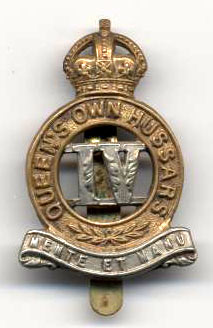
Finally
this war was over, the east German territories were
now under Soviet command and soon to be part of the new
Polish state.
What happened
to those that used to live there?
They
were evicted and lived in our case as follows:
a)
Branitz - January 21, 1945 to March 23, 1945
b)
"Sudentenland", the part of the Czech
Republic that was merged into the German Reich,
Märisch-Schönberg; Würbental - March 23, 1945 to
June 1945
c)
Polisch Silesia, Gleiwitz; Habelschwert, June 1945 to
March 23, 1946
Finally
in 1947 the received papers to leave Poland and to go to
Germany, to West Germany, living for months in refugee
camps (Lamme 10, refugee camp close to Brunswick until
1949) and being treated as such by their own people.
Certainly times were hard and food and goods were
scarce, so that those eastern German folks were looked
at with skepticism.
With
life getting back to normal, at least in the western
part of the former Reich, one had to go through the
process called denazification. One had to prove to not
have been a supporting part of the Nazi movement. Being
a former member of the SS and party member did not help
to clean his slate. Not enough that they were refugees
with yet a funny accent from Silesia, they had to prove themselves
again and adapt once more to a new lifestyle.
He
did not quite make the cut in his first attempt to
cleans himself from recent history and had to appeal the
courts decision, being classified as category IV -
supporter. Lucky for us today we can review and piece together the history of these
events. Besides his affidavit we have several witnesses
that attest in writing to his fine character. There are
those of royal descent, like Mrs. Luise v. Belling, a
born Baroness von Roth, the State Secretary of the
Christian Democratic Party in Brunswick, Mr. Carl
Schönfeld, former colleagues as well as even former
employees of his father in law's construction business.
This
was certainly enough to clean his record in the eye of
the law, but still not enough to get him back into the
newly found military service, the German Bundeswehr.
This new found army did certainly offer a good career
choice. Especially for a well seasoned engineer with
construction experiences. His application for the
service did include facts about his involvement in
building the bunkers and reinforcements on the
Mediterranean Sea as well as on the Atlantic. He also
built a 1800 m long tank wall in Marseille, France, as
well as designed and built the very first nuclear bunker
in his new hometown Münster in Westphalia.
His
earlier choices to blend in prevented him from
re-entering the new found military service. However, he
again adapted and again survived, ending his career as an engineer at the Waterways
and Shipping Office.
Thanks
to his army application in 1956 we know about his
military career, promotions and awards:
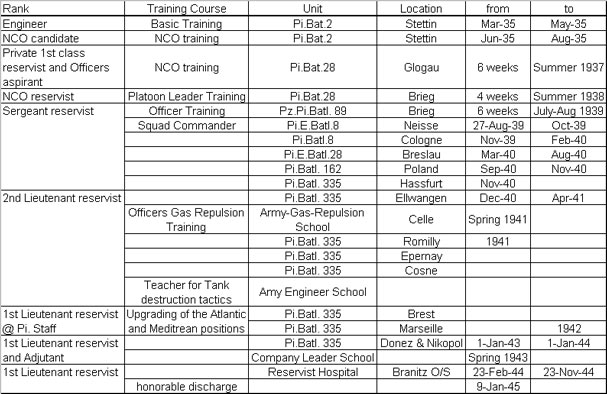


And
so again I say: "Keeping one's principle up and
trying to be a good man is a difficult task at
times."
Grandfather
Hansgeorg Lopatta passed March 27, 1971, to a place were adaptation was
hopefully not necessary anymore. He was a good man.
©
Andreas M. Schulze Ising VII/2009 | 




